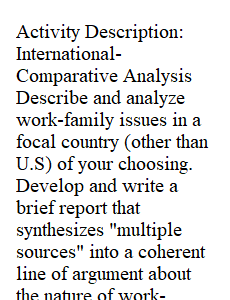


Q Activity Description: International-Comparative Analysis Describe and analyze work-family issues in a focal country (other than U.S) of your choosing. Develop and write a brief report that synthesizes "multiple sources" into a coherent line of argument about the nature of work-family linkages in your focal country. Use the broad themes of the course (changes and conflicts, social structure, agency, business practices, public response and issues of diversity) and the following questions to generate a country profile: What are the demographic trends related to work-family issues? How do national policies address work-family issues? What are the hot topics in research on work-family issues? What do people think about work-family issues? How do work-family issues vary for different social groups (e.g., women/men, adults/children, one-parent/two-parent families, natives/immigrants)? Anything else you would like to share? Format: With this assignment, it may be best to submit in a Word or PDF attachment. Make sure you create a title page for your assignment. Please limit your report to approximately 2-3 pages. A seamless narrative is better than an abundance of disjointed or rambling pieces of information. Use APA guidelines for citation formats within the body of your report as well as your list of references.
View Related Questions